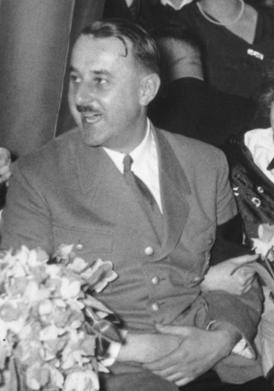Hermann Esser
Hermann Esser, the son of a civil servant, was born in Röhrmoos, Bavaria, on 29th July, 1900. He served in the German Army in the later stages of the First World War. Esser returned to Germany as a radical socialist and took a job working for a left-wing provincial newspaper.
Esser was originally a member of the German Social Democrat Party but in 1919 he joined with Anton Drexler, Gottfried Feder and Dietrich Eckart to form the German Worker's Party (GPW) in Munich.
Esser, the editor of Volkischer Beobachter (Peoples Observer), was in charge of Nazi Party propaganda. He did not take part in the Beer Hall Putsch in 1923 and was accused of cowardice. He claimed he was ill and spent the day in bed. Esser fled to Austria and when he returned in January 1924, he was sentenced to three months' imprisonment. After his release, he visited Hitler in Landsberg Castle in Munich and gradually won his forgiveness.
Konrad Heiden (author) described Esser as the "arch-type of the National Socialist" and his biographer, Louis L. Snyder, claimed that: "Esser lacked the inhibitions that even Hitler had. Crude and uncultured, of low moral character, Esser was involved in one escapade after another. A brash, arrogant rowdy, he was arrested again and again for unlawful behaviour. The scandals in his private life proved to be a liability even for the Nazi Party." His main opponent in the party was Gregor Strasser: "Esser's private life is immoral. His actions are egotistic. His behaviour in November 1923 was cowardly and most unworthy of a real National Socialist."
He first wrote and published his book Die jüdische Weltpest (The Jewish World Plague) in 1933. After the pogroms of the Kristallnacht of 9 November 1938, he republished it in early 1939, again under the NSDAP press.
On 12 April 1933, he was appointed a Minister without Portfolio in the Bavarian government. He was also named head of the Bavarian Press Office and Chief of the Bavarian State Chancellery. This was followed on 1 March 1934 by his appointment as Bavaria's Minister of Economics by Bavarian Reichsstatthalter (Reich Governor) Franz Ritter von Epp. Esser intrigued against the powerful Gauleiter of Gau Munich-Upper Bavaria Adolf Wagner and, as a result, was forced out of his ministerial posts on 14 March 1935. After his exclusion from politics in Bavaria, Esser did not wield any significant political power. In April 1936 he was appointed Chairman of the Reich Committee for Foreign Tourism, and on 27 January 1939 State Secretary for Tourism in the Reich Propaganda Ministry under Joseph Goebbels. On 4 March 1939 he was promoted to Gruppenführer of the National Socialist Flyers Corps (NSFK). His last official duty was on 24 February 1945 in Munich, delivering a speech on behalf of Hitler at the 25th anniversary of the adoption of the Nazi Party program.
Listen to a brief audio biography of Herman Esser
Born 29th July 1900
Röhrmoos, Kingdom of Bavaria, German Empire
Died 7th February 1981 (aged 80)
Dietramszell, Bavaria, West Germany


